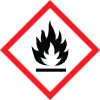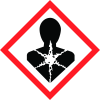Luperox DI, tert-Butyl peroxide
Sigma-Aldrich Chemie GmbH
Revision date : 2021-07-28


General Information
Revision date
2021-07-28
Product name
Luperox DI, tert-Butyl peroxide
CAS No.
110-05-4
REACH No
is
Icons in SDS
Company Information
Company name
Sigma-Aldrich Chemie GmbH
E-mail address of the competent person responsible for the Safety Data Sheet
technischerservice@merckgroup.com
GHS Information
Signal word
Danger
Hazard Codes
Hazard statements (CLP)
H225, H242, H341, H412
Hazard statements
Code
Statements
H225
Highly Flammable liquid and vapour
H242
Heating may cause a fire
H341
Suspected of causing genetic defects
H412
Harmful to aquatic life with long lasting effects
Precautionary statements
Code
Statements
P210
Keep away from heat, hot surface, sparks, open flames and other ignition sources. - No smoking.
P220
Keep away from clothing and other combustible materials.
P273
Avoid release to the environment.
P280
Wear protective gloves/protective clothing/eye protection/face protection.
P410
Protect from sunlight.
P411+P235
Store at temperatures not exceeding ... °C/...°F. Keep cool.
Section 2
CLP CLASSIFICATION
Flammable liquids (Category 2), H225 Organic peroxides (Type E), H242 Germ cell mutagenicity (Category 2), H341 Long-term (chronic) aquatic hazard (Category 3), H412 For the full text of the H-Statements mentioned in this Section, see Section 16.
2.2 Label elements
Labelling according Regulation (EC) No 1272/2008
Signal word
Danger
Hazard statements
H225 Highly flammable liquid and vapor. H242 Heating may cause a fire. H341 Suspected of causing genetic defects. H412 Harmful to aquatic life with long lasting effects.
Precautionary statements
P210 Keep away from heat, hot surfaces, sparks, open flames and other ignition sources. No smoking. P220 Keep/Store away from clothing/ combustible materials. P273 Avoid release to the environment. P280 Wear protective gloves/ protective clothing/ eye protection/ face protection. P410 Protect from sunlight. P411 + P235 Store at temperatures not exceeding 30°C/ 86 °F. Keep cool.
Supplemental label elements
none
2.3 Other hazards
This substance/mixture contains no components considered to be either persistent, bioaccumulative and toxic (PBT), or very persistent and very bioaccumulative (vPvB) at levels of 0.1% or higher.

